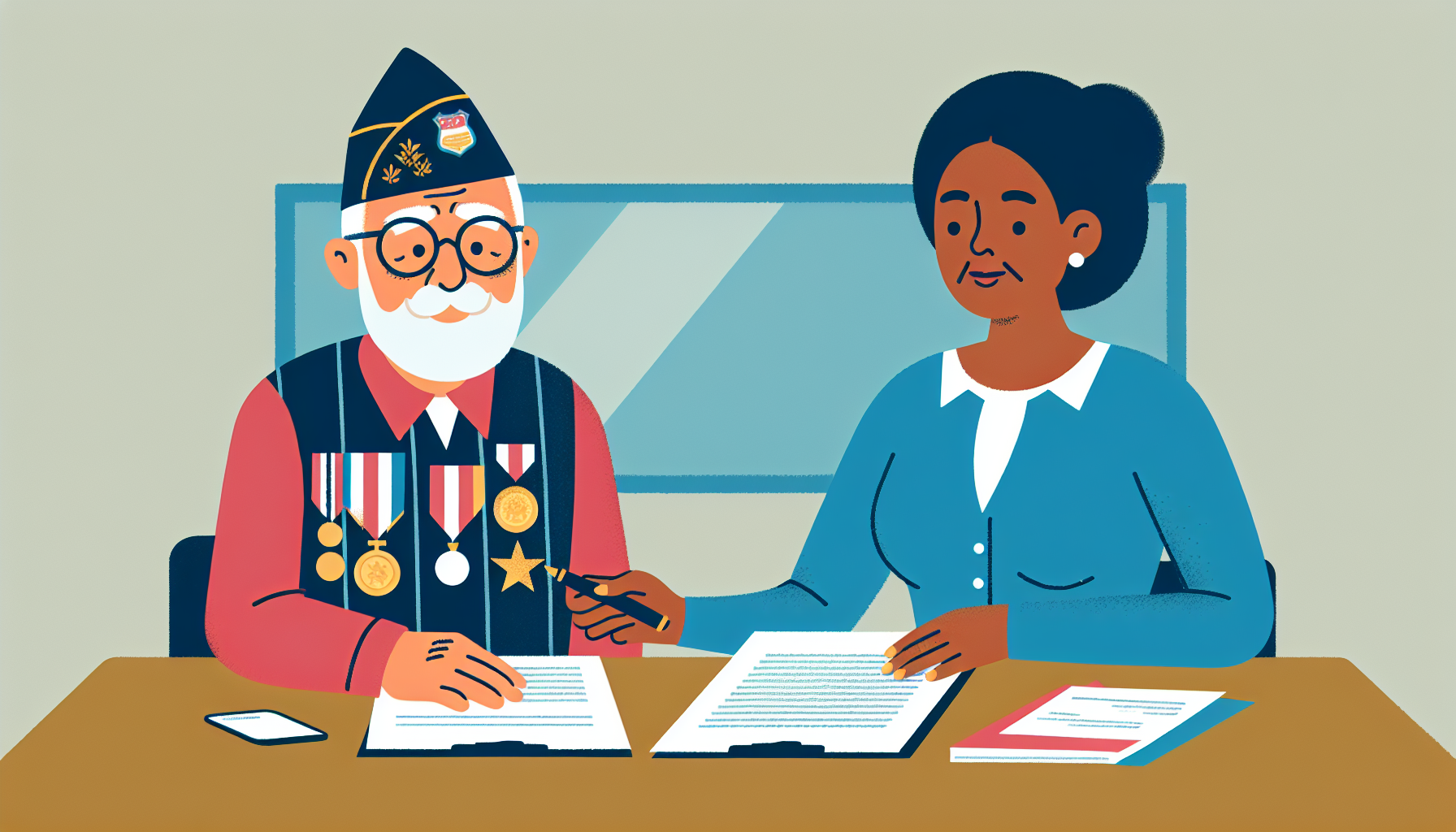Definition
The VA Fiduciary Program is a program administered by the U.S. Department of Veterans Affairs (VA) for veterans and other beneficiaries who, due to injury, disease, or age, are unable to manage their financial affairs. Under this program, the VA appoints a fiduciary, who is a person or institution responsible for managing the beneficiary’s VA benefits. The goal of the program is to protect the financial interests of vulnerable beneficiaries and ensure that they receive the assistance they need.
Key Takeaways
- The VA Fiduciary Program is designed to help vulnerable veterans, or their beneficiaries, who are unable to manage their financial affairs due to injury, disease, or age. It helps protect their VA benefits by appointing a fiduciary to oversee their financial management.
- A fiduciary may be a family member, friend, or professional appointed by the VA following a thorough assessment, which includes credit checks, background investigations, and interviews, to ensure they have the best interests of the veteran in mind.
- The appointed fiduciary is responsible for managing the veteran’s VA benefits, ensuring proper use of funds, and reporting the financial status of the beneficiary to the VA yearly or as requested. The VA provides oversight and monitoring to ensure fiduciaries are performing their duties effectively and for the benefit of the veteran or beneficiary.
Importance
The VA Fiduciary Program is a crucial aspect of the Department of Veterans Affairs benefits system, as it ensures that veterans who require assistance in managing their financial affairs receive the support they need.
This program appoints a fiduciary, a person responsible for managing the financial matters of a beneficiary, when a veteran or another beneficiary is deemed unable to manage their VA benefits due to injury, illness, or aging-related conditions.
The fiduciary, who can be a family member, friend, or a professional, serves as a guardian and advocate for the veteran’s best interests, safeguarding their assets and utilizing the benefits for their well-being.
Overall, the VA Fiduciary Program plays a vital role in safeguarding the financial stability and rights of vulnerable veterans and their families.
Explanation
The VA Fiduciary Program serves a crucial purpose in providing assistance and support to veterans, beneficiaries, and their family members who are unable to manage their Department of Veterans Affairs (VA) benefits independently. This inability to manage their finances could be due to reasons such as cognitive impairments, injuries, disabilities, or even age-related infirmities that might compromise their decision-making abilities.
The core objective of this program is to safeguard and ensure that the VA benefits are utilized effectively for the well-being and benefit of those concerned parties, by appointing a reliable and responsible fiduciary to manage their funds. The fiduciaries appointed through this program play a critical role in the lives of the recipients.
These individuals or organizations are entrusted with the responsibility of managing the funds in the best interests of the beneficiaries and providing for their needs such as accommodation, healthcare, education, and other essentials. VA fiduciaries are subject to rigorous background checks, thorough assessments, and ongoing supervision to ensure that they maintain the highest standards of reliability and accountability in the management of the beneficiaries’ assets.
In essence, the VA Fiduciary Program strives to offer stability, security, and a better quality of life for those who have selflessly served the nation and now require assistance in handling their hard-earned benefits.
Examples of VA Fiduciary Program
The VA Fiduciary Program is designed to protect veterans and other beneficiaries who, due to injury, disease, or age, are unable to manage their own financial affairs. Here are three real-world examples that illustrate the use of the VA Fiduciary Program:
Elderly Veteran with Dementia: An elderly veteran living in a nursing home is diagnosed with dementia and is unable to manage his monthly pension and disability benefits from the VA. His family contacts the VA, and the VA Fiduciary Program assigns a fiduciary to manage his benefits and ensure they are used for his care, well-being, and personal needs.
Disabled Veteran with Traumatic Brain Injury (TBI): A young veteran who was severely injured in combat returns home and is now unable to work due to a traumatic brain injury. She has difficulty managing her finances and is not able to coordinate her own care. Her spouse contacts the VA, and a fiduciary is assigned to help the veteran manage her compensation and pension benefits. This ensures her living expenses, medical care, and other personal needs are met.
Legal Guardian for a Minor Child: A veteran passes away, leaving a surviving spouse and a minor child. The surviving spouse also passes away, and the child is entitled to receive VA survivor benefits known as the Dependency and Indemnity Compensation (DIC). A relative becomes the child’s legal guardian, but the VA determines the legal guardian is not capable of managing the child’s VA benefits. In this scenario, the VA Fiduciary Program assigns a fiduciary to manage the child’s DIC benefits and oversee the distribution of funds for the child’s education, healthcare, and personal needs until they reach the legal age of 18 or the age designated by the state.
VA Fiduciary Program FAQ
1. What is the VA Fiduciary Program?
The VA Fiduciary Program is a service provided by the Department of Veterans Affairs to protect the benefits of veterans and beneficiaries who are unable to manage their financial affairs due to injury, disease, or age. The program appoints a fiduciary, who is responsible for managing the beneficiary’s VA benefit payments and ensuring their needs are met.
2. Who is eligible for the VA Fiduciary Program?
Veterans and beneficiaries who have been determined by the VA as being unable to manage their VA benefits due to mental incompetence, physical disability, or advanced age are eligible for the Fiduciary Program. A VA-appointed medical professional makes this determination.
3. How is a fiduciary appointed?
A VA field examination is conducted to gather information and assess the beneficiary’s needs. If it is determined that a fiduciary is required, the VA will select a suitable individual or entity. The VA generally looks to appoint a family member or friend, but if none are available, a professional fiduciary may be appointed.
4. What are the responsibilities of a fiduciary?
A fiduciary is responsible for managing the VA benefit payments for the beneficiary. This includes paying for the beneficiary’s daily needs, such as food, clothing, shelter, and medical expenses, as well as managing finances, investments, and real property. The fiduciary must act in the beneficiary’s best interest and report to the VA on an annual basis.
5. Can a beneficiary request a new fiduciary?
If a beneficiary is unhappy with their current fiduciary, they can request a new one by contacting their local VA office and providing a reason for the change. The VA will review the request and, if deemed necessary, will appoint a new fiduciary.
6. How can I apply for the VA Fiduciary Program?
If you believe you or a loved one may need a fiduciary, contact your local VA office to schedule a field examination. The VA staff will guide you through the process and determine if a fiduciary is necessary for your situation.
Related VA Benefit Terms
- VA Fiduciary Appointment
- Vulnerable Veterans
- Beneficiary Financial Protection
- Fiduciary Supervision
- VA Benefit Administration
Sources for More Information
- U.S. Department of Veterans Affairs
- Veterans Benefits Administration
- Veterans Aid & Attendance Benefit Program
- National Veterans Legal Services Program
 Benefits.com Advisors
Benefits.com Advisors
With expertise spanning local, state, and federal benefit programs, our team is dedicated to guiding individuals towards the perfect program tailored to their unique circumstances.
Rise to the top with Peak Benefits!
Join our Peak Benefits Newsletter for the latest news, resources, and offers on all things government benefits.




















